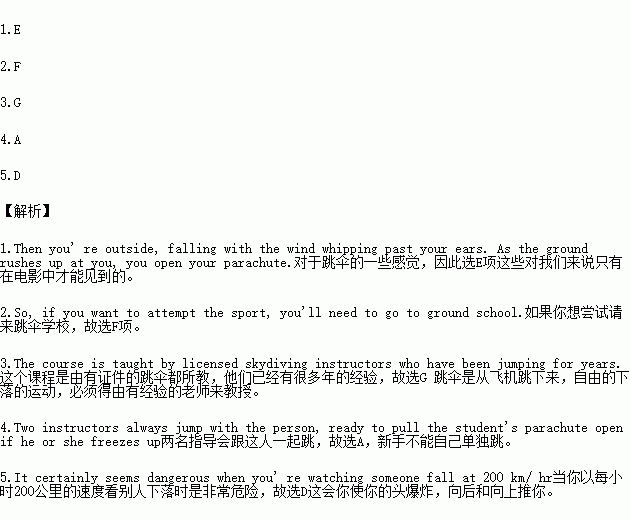题目内容
E
Imagine yourself in a small airplane 3,300 meters above the ground. The engines roar in your ears as you move towards the open door. Then you' re outside, falling with the wind whipping past your ears. As the ground rushes up at you, you open your parachute. 1.. All in all, you were in free fall for only 30 seconds---the longest 30 seconds of your life.
2.. However, a growing number of adventurers are taking the risk. Obviously skydiving isn't something you can just try, like fishing or bowling. So, if you want to attempt the sport, you'll need to go to ground school.
3.. The course is taught by licensed skydiving instructors who have been jumping for years.
They'll teach you how to keep your body position stable. You'll also learn to be constantly aware of your altitude and, most importantly, when to open your parachute.
Once you' re through with ground school, it's time to get up in the air. 4.. Two instructors always jump with the person, ready to pull the student's parachute open if he or she freezes up.
5.. It certainly seems dangerous when you' re watching someone fall at 200 km/ hr. But, if you believe the statistics, skydiving is actually safer than driving, with one fatality (死亡) occurring in approximately 60, 000 jumps. Moreover, most enthusiasts agree all fear stops the second your feet leave the plane, and when you land, the only thought in your mind is, "Wow! I want to do that again!"
A. However, a new jumper never jumps alone.
B. It takes years to forget the taste of fear from skydiving.
C. No doubt, you're thinking skydiving is a dangerous sport.
D. It explodes over your head, pulling you back and upwards.
E. For most of us, skydiving is something we only see in the movies.
F. Ground school is where you learn to jump, without leaving the ground.
G. Skydiving is the sport of jumping out of an airplane and falling freely through the air.

